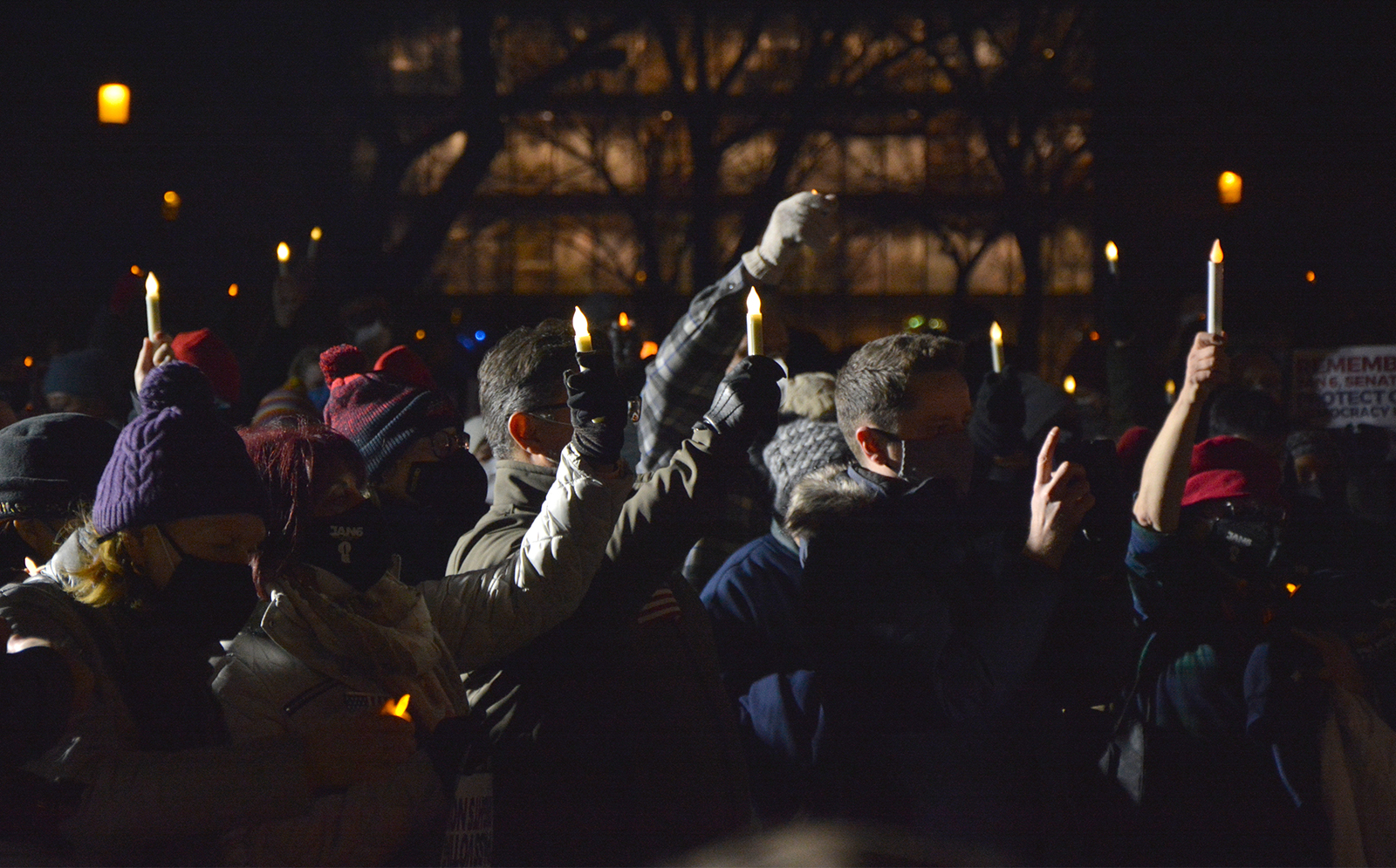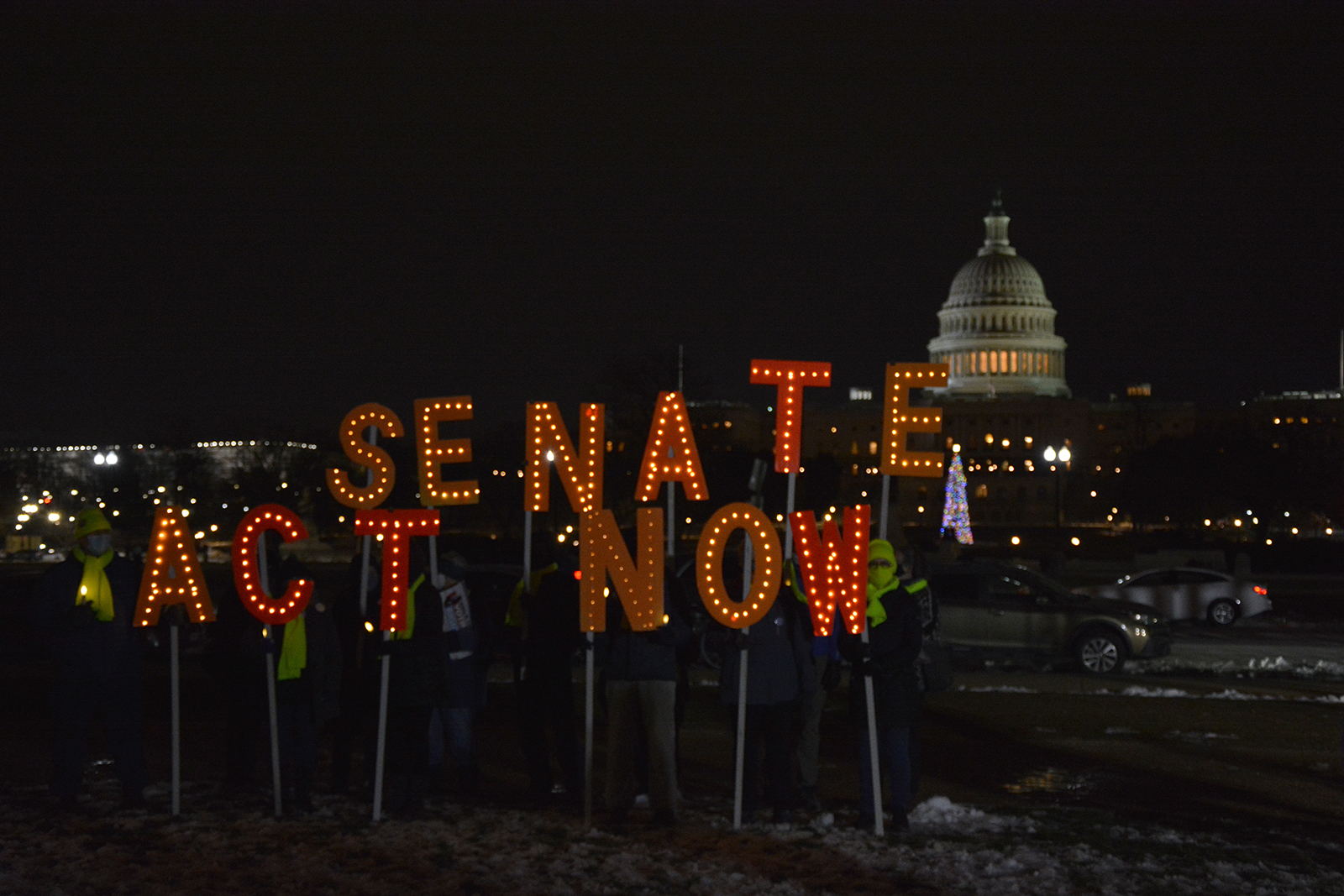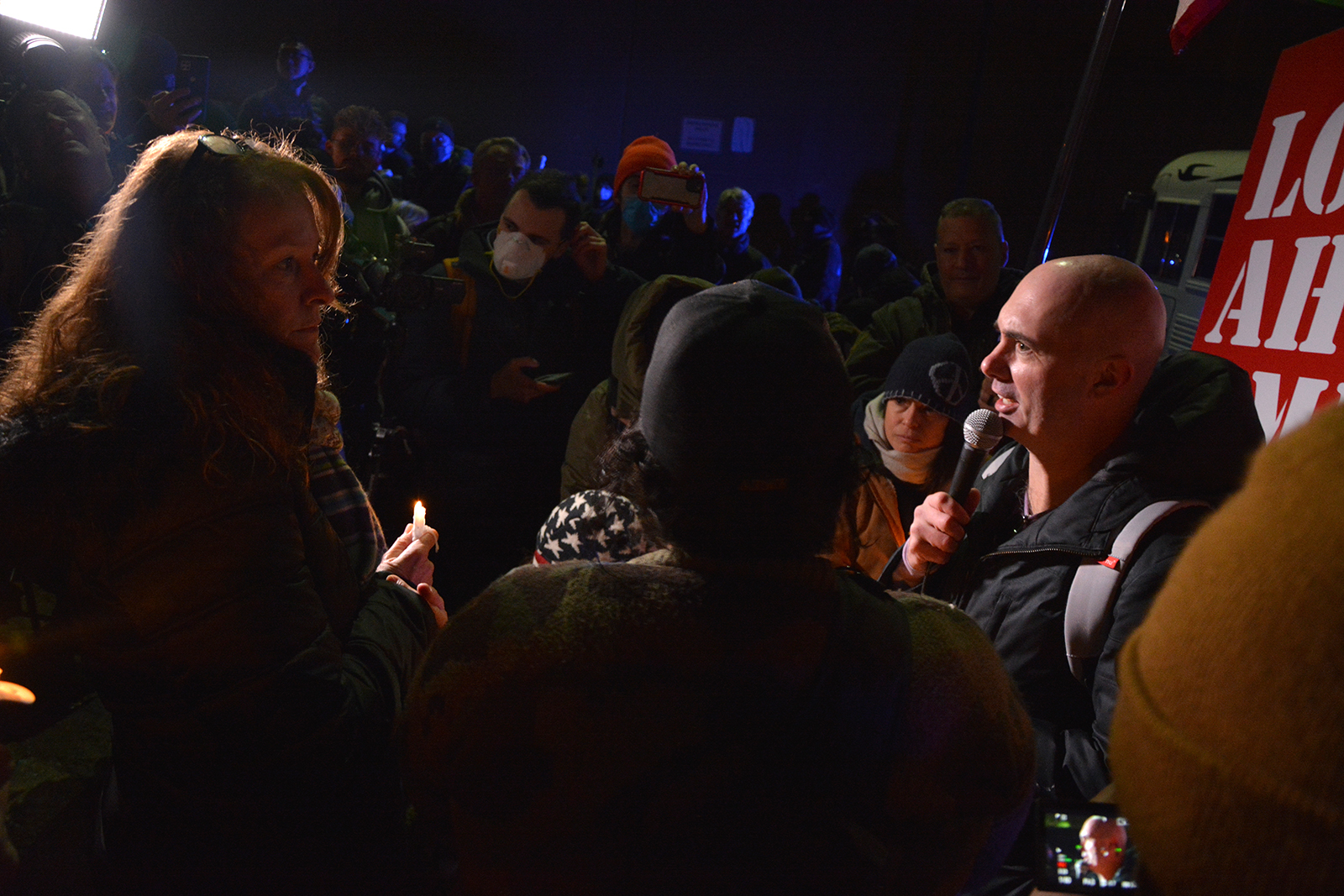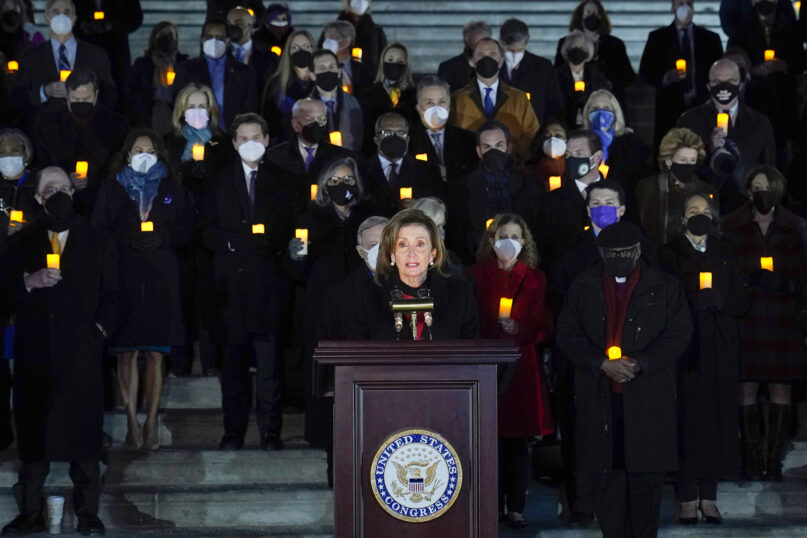WASHINGTON (RNS) — The nation’s capital hosted an array of vigils Thursday (Jan. 6) to mark the one-year anniversary of the U.S. Capitol attack, with groups representing a broad spectrum of ideological and religious views lifting candles and prayers to observe the moment in very different ways.
On Capitol Hill, lawmakers closed out a day of events remembering the insurrection with a brief prayer service on the eastern steps of the Capitol. Standing before dozens of lawmakers as they cupped candles, the Rt. Rev. Michael Curry, presiding bishop of the Episcopal Church, prayed for God’s help.
“We need your help in these troubled times,” Curry said. “We need your help for this beloved nation. We need your help for those who have been traumatized and troubled by the painful events of one year ago — and all that has continued since. We need your help, Lord, now, to be the democracy you would have us to be. To be the nation you would have us to be — one nation, under God, indivisible, with liberty and justice for all.”
He asked God to help those present, who appeared to be primarily Democrats, to be “instruments of your peace, instruments of your love and instruments of your healing — for this land, for this Congress, for this government, for ‘We the people,’ for this country and this world.”
House Speaker Nancy Pelosi then requested a moment of silence to “prayerfully mark one year since the insurrection and patriotically honor the heroes who defended the Capitol and our democracy that day.”
RELATED: Jan. 6: A timeline in prayers
Lawmakers dispersed a short time later as a performer sang a rendition of “God Bless America.”
Down the hill on the National Mall, another group of lawmakers gathered with hundreds of supporters and liberal activists for a lengthy vigil that doubled as a political rally. It focused less on prayer than on activism, with speakers tying last year’s insurrection to present-day fights over voting rights legislation.

People attend a candlelight vigil on the National Mall on Jan. 6, 2022, in Washington, on the one-year anniversary of the attack on the U.S. Capitol. RNS photo by Jack Jenkins
Jana Morgan, head of the Declaration for American Democracy, a broad liberal coalition that advocates for federal voting rights legislation, said the insurrection constituted “a violent and deadly attack against all Americans and our freedom as voters to choose the leaders who represent us.” But the assault on the democratic process, she argued, was not merely past-tense.
“As we stand here today, the same faction of extremists who attacked our country on Jan. 6, 2021, are hard at work attempting to silence our voices by restricting our freedom to vote, attacking fair districts and quietly preparing future attempts to sabotage our elections,” she said.
Morgan and other speakers accused Republicans of chipping away at voting rights and vented frustration with Democrats — namely, Sen. Joe Manchin and President Joe Biden — who they suggested are not doing enough to stop such moves. As a remedy, they called on liberal lawmakers to pass federal voting rights legislation such as the Freedom to Vote Act and the John Lewis Voting Rights Act, as well as grant statehood to Washington, D.C.
“As we remember the victims of last year’s attack, we also vow to never back down in the face of those who attempt to silence the will of the American people,” Morgan said. “Failure is not an option.”
The policy proposals resembled a voting rights-focused agenda championed by an array of faith leaders — especially Black clergy — throughout 2021. To wit, the vigil, like the Declaration for American Democracy coalition, boasted several liberal-leaning faith groups among its sponsors, such as Faith in Public Life and the National Council of Jewish Women.
Milling about the crowd with a “Franciscans for Justice” sign was Michele Dunne, head of the Franciscan Action Network.
“As Franciscans, we believe in the equality of all people, and that means equal access to political power and political decision-making,” she said. “Therefore, we think it’s important to preserve democracy in the United States.”

People attend a candlelight vigil on the National Mall on Jan. 6, 2022, in Washington, on the one-year anniversary of the attack on the U.S. Capitol. RNS photo by Jack Jenkins
Other speakers included Rep. Jamie Raskin, a Maryland lawmaker who sits on the House Select Committee to Investigate the January 6 Attack, as well as Harper White, a congressional staffer who recounted his harrowing experiences during the attack.
About midway through the event, organizers observed a moment of silence for those who died on Jan. 6, those present at the attacks who committed suicide shortly after, police officers and others who were wounded during the insurrection as well as those who were “outraged and more committed to standing up for their democracy.” As hundreds held candles aloft, a singer from Baltimore sang “Amazing Grace.”
As the liberal event began to disperse, a very different vigil began less than three miles away outside a Washington jail. A small band of activists, who were visibly outnumbered by reporters and police, gathered to express support for the people held in the jail on charges stemming from the insurrection.
Attendees identified as part of the “Justice for J6” movement, which argues people charged in the insurrection are being treated unfairly. Vigil attendees were dismissive of the attack itself, repeatedly downplaying its severity. One referred to it as a “ghost of an insurrection.”
The group sang a mixture of patriotic songs and hymns throughout the vigil, ranging from “The Battle Hymn of the Republic” to “God Bless America” to “Jesus Loves the Little Children.”
Among the crowd was Micki Witthoeft, the mother of Ashli Babbitt, who was shot and killed by police while participating in the Capitol attack last year. Attendees held photos of Babbitt, who has been cast as a martyr by some conservatives.

Matt Braynard, right, speaks during a candlelight vigil associated with the “Justice for J6” movement in support of the so-called political prisoners of the Jan. 6 insurrection at the U.S. Capitol, at the Washington Central Detention Facility where several are being held, Jan. 6, 2022, in Washington. RNS photo by Jack Jenkins
As Witthoeft passed out pamphlets that referred to people charged in connection with the insurrection as “political prisoners,” she was asked whether faith informs her activism.
“I don’t claim any particular faith: I love God, I love Jesus Christ, I love America, and I miss my daughter,” she said.
She then accused the officer who shot her daughter, who was cleared of any wrongdoing after an internal investigation by U.S. Capitol Police, of murder.
RELATED: Interfaith vigil in DC gathers for second year, part of citywide Jan. 6 observances
Asked about the event’s religious elements, vigil organizer Matt Braynard likened his support for insurrectionists to causes such as the civil rights movement, the women’s suffrage movement and the fight to end slavery.
“All of them were driven by a religious conviction,” said Braynard, who added that he is Catholic.
The event contrasted sharply with yet another vigil convened outside Luther Place church in downtown Washington on Thursday morning. The surge of reporters that later orbited the “Justice for J6” vigil was nowhere to be seen as the group at Luther Place quietly gathered in the snow. They assembled not only to mark the insurrection anniversary, but also to recall the interfaith vigil assembled in the same location one year prior.
The original interfaith prayer vigil constituted one of the only counterprotests against Trump supporters as they descended on the city on Jan. 6, 2021. At the time, the group of primarily clergy had gathered around a church-owned Black Lives Matter sign that had replaced a separate banner destroyed weeks earlier when members of the extremist group Proud Boys marauded through the streets of Washington, tore Black Lives Matter signs off churches and set one ablaze.
Upon seeing the vigil that day, a few passersby in Trump gear responded by barging into the middle of the prayer circle and mockingly reenacting the murder of George Floyd.
On Thursday, clergy at the anniversary vigil recalled the incident as a moment of trauma and lamented the attack on the Capitol that took place later that same day. They decried insurrectionists, with one speaker blasting those who attacked the Capitol and those who vandalized the sign as white supremacists and devotees of Christian nationalism.
But the group remained defiant in their pursuit of prayerful activism. The Rev. Karen Brau, pastor of Luther Place, suggested neither the harassment nor the insurrection would cow them.
“Our praying did not cease,” she said.





